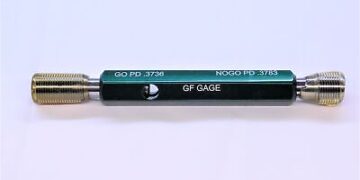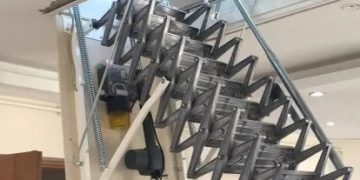In the world of precision engineering and manufacturing, the accuracy and reliability of components are paramount. One such critical component that plays a vital role in ensuring the integrity of threaded connections is the NPSM thread gauge. While often overlooked, these gauges are indispensable tools in industries ranging from plumbing to aerospace. This guest post delves into the intricacies of NPSM thread gauges, exploring their importance, applications, and how to select the right gauge for your needs.
What Are NPSM Thread Gauges?
NPSM stands for National Pipe Straight Mechanical, a type of pipe thread that is designed to create a mechanical seal, typically without the need for thread sealants. Unlike tapered threads, which rely on the tapering of the threads to form a seal, NPSM threads are parallel or straight. This makes them ideal for situations where a leak-proof seal is not required but where precise mechanical fastening is necessary.
NPSM thread gauges are tools used to check the accuracy and conformity of these threads. They ensure that the threads meet the required specifications and are suitable for use in their intended applications. There are two main types of NPSM thread gauges:
- NPSM Plug Gauges: These are used to check the internal threads of a component, ensuring that they are correctly sized and formed.
- NPSM Ring Gauges: These are used to check the external threads, confirming that they match the specifications.
Both types are essential for quality control in manufacturing, ensuring that parts will fit together correctly in assembly and function as intended.
Importance of NPSM Thread Gauges
The importance of NPSM thread gauges cannot be overstated. In manufacturing, even a small deviation from the specified thread dimensions can lead to significant issues, including leaks, mechanical failures, and costly reworks. By using thread gauges, manufacturers can:
- Ensure Quality: Thread gauges provide a reliable means of checking that threads are cut or formed correctly. This helps maintain the high quality of the final product.
- Prevent Failures: Incorrectly sized or formed threads can lead to failures in the field, which can be dangerous and expensive. NPSM thread gauges help prevent these issues by ensuring that every thread meets the required standards.
- Increase Efficiency: By catching threading errors early in the manufacturing process, thread gauges help prevent rework and scrap, saving time and money.
Applications of NPSM Thread Gauges
NPSM thread gauges are used in a wide range of industries and applications. Gaugestools offers top-notch NPSM thread gauges products that are crafted with utmost attention to detail and quality. With a commitment to excellence, Gaugestools provides professionals with reliable tools that meet industry standards, making them a trusted choice for those in need of accurate thread measurement solutions.
Some of the most common include:
- Plumbing and Pipe Fittings: NPSM threads are commonly used in plumbing and pipe fittings, where they provide a secure mechanical connection without the need for a taper. NPSM thread gauges ensure that these threads are correctly sized and will fit together properly.
- Aerospace and Defense: In aerospace and defense applications, precision is critical. NPSM thread gauges are used to ensure that threaded connections in these industries meet the strict tolerances required for safety and reliability.
- Automotive Industry: The automotive industry relies on a variety of threaded components, from engine parts to exhaust systems. NPSM thread gauges help ensure that these components will fit together correctly and function as intended.
- Hydraulics and Pneumatics: In hydraulic and pneumatic systems, where leaks can lead to loss of pressure and system failure, NPSM thread gauges are used to ensure that connections are properly formed and will not leak.
How to Select the Right NPSM Thread Gauge
Selecting the right NPSM thread gauge is essential to ensuring the accuracy and reliability of your threaded connections. Here are some factors to consider when choosing a thread gauge:
- Thread Size: The first step in selecting a thread gauge is to determine the size of the thread you need to measure. NPSM thread gauges are available in a range of sizes, so it’s important to choose one that matches the size of the threads you are working with.
- Tolerances: The tolerance of the thread gauge is another important consideration. The tolerance determines how much deviation from the nominal size is acceptable. In applications where precision is critical, a tighter tolerance may be required.
- Material: The material of the thread gauge is also important. High-quality thread gauges are typically made from hardened steel, which is durable and resistant to wear. However, in some applications, gauges made from other materials, such as carbide, may be more appropriate.
- Calibration: Ensuring that your thread gauge is properly calibrated is essential for accurate measurements. Look for a gauge that comes with a calibration certificate, or have your gauge regularly calibrated by a professional service.
- Gauge Type: As mentioned earlier, there are two main types of NPSM thread gauges: plug gauges and ring gauges. It’s important to choose the right type of gauge for the threads you are measuring. In some cases, you may need both types to ensure that all aspects of the thread are correctly sized and formed.
- Brand and Quality: Not all thread gauges are created equal. It’s important to choose a gauge from a reputable manufacturer known for producing high-quality, reliable tools. While it may be tempting to choose a cheaper option, investing in a high-quality thread gauge can save you time and money in the long run by preventing errors and rework.
Maintaining Your NPSM Thread Gauges
Proper maintenance of your NPSM thread gauges is essential to ensure their accuracy and longevity. Here are some tips for maintaining your gauges:
- Regular Cleaning: Thread gauges should be cleaned regularly to remove any dirt, oil, or debris that could affect their accuracy. Use a soft brush and a mild solvent to clean the gauges, being careful not to damage the threads.
- Proper Storage: When not in use, thread gauges should be stored in a protective case or sleeve to prevent damage. Avoid storing them in areas where they could be exposed to moisture or extreme temperatures, as this could cause them to rust or warp.
- Calibration: As mentioned earlier, regular calibration is essential to ensure that your thread gauges remain accurate. Depending on how often they are used, gauges should be calibrated every six to twelve months by a professional service.
- Handling: Handle your thread gauges with care to avoid dropping or striking them against hard surfaces. Even a small dent or scratch can affect the accuracy of the gauge and lead to incorrect measurements.
Conclusion
NPSM thread gauges are essential tools in the manufacturing and engineering industries, ensuring the accuracy and reliability of threaded connections. By understanding the importance of these gauges, knowing how to select the right one, and maintaining them properly, you can ensure that your components meet the highest standards of quality and precision. Whether you’re working in plumbing, aerospace, or any other industry that relies on threaded connections, NPSM thread gauges are a vital part of your toolkit, helping you achieve the best results in your work.















































